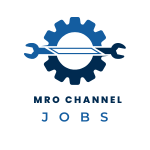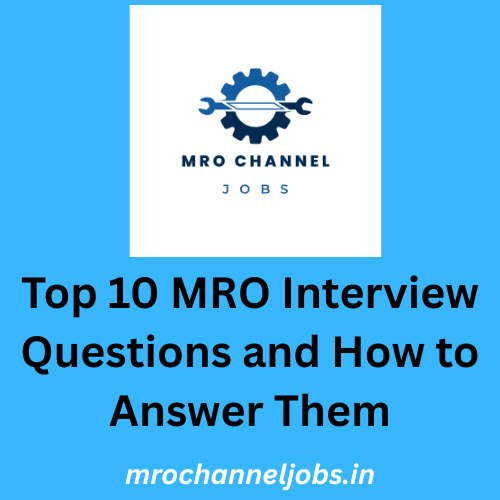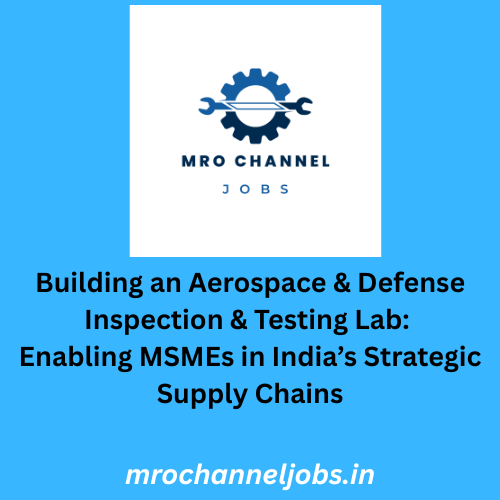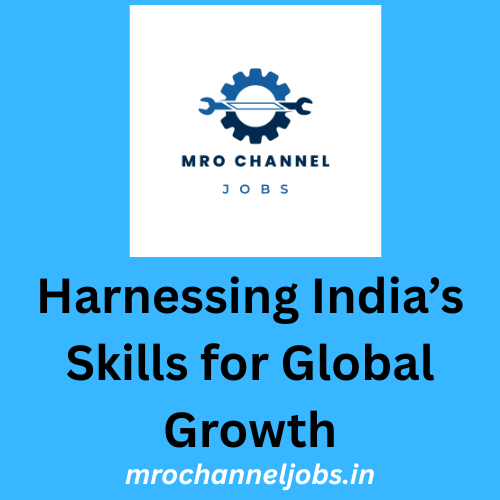Maintenance, Repair, and Overhaul (MRO) is the backbone of industries like aviation, defense, manufacturing, automotive, and energy. Employers in this sector look for candidates who not only have technical skills but also demonstrate problem-solving, safety awareness, and the ability to work under pressure. Preparing for interviews in MRO requires both domain knowledge and confidence in explaining your experience.
Here are the top 10 MRO interview questions and strategies on how to answer them effectively:
1. Can you explain what MRO means and why it is important?
Why this is asked: Interviewers want to test your conceptual clarity.
How to answer:
Define MRO as the set of activities ensuring equipment, systems, and assets continue to function optimally. Explain its importance in reducing downtime, extending asset life, and ensuring safety.
Sample approach:
“MRO refers to Maintenance, Repair, and Overhaul of assets. It’s crucial because it minimizes equipment failures, improves productivity, and ensures compliance with safety standards. For example, in aviation, MRO is not just about cost efficiency but about ensuring passenger safety and regulatory compliance.”
2. What types of maintenance strategies do you know?
Why this is asked: To check your technical knowledge and industry awareness.
How to answer:
Mention preventive, predictive, corrective, and condition-based maintenance. Briefly explain each and, if possible, relate it to your past work.
Sample approach:
“I’m familiar with preventive maintenance, predictive maintenance using condition monitoring tools, corrective maintenance after a breakdown, and reliability-centered maintenance. In my last role, I worked on shifting from scheduled preventive checks to predictive monitoring using vibration analysis, which reduced downtime by 15%.”
3. How do you prioritize multiple maintenance tasks under pressure?
Why this is asked: To evaluate your decision-making skills.
How to answer:
Talk about using risk assessment, safety criticality, and business impact as criteria.
Sample approach:
“I prioritize tasks by considering safety first, then operational impact. For example, a repair on a critical production line takes precedence over non-essential equipment. I also use tools like CMMS dashboards to evaluate pending tasks and assign manpower effectively.”
4. Can you share an example of a major breakdown you handled?
Why this is asked: To test practical experience and problem-solving.
How to answer:
Use the STAR method (Situation, Task, Action, Result).
Sample approach:
“In one instance, our HVAC system failed during peak summer. I quickly assembled the team, diagnosed a compressor issue, and coordinated a replacement within 24 hours. This minimized downtime and prevented disruption to operations, saving the company significant losses.”
5. What tools and software are you familiar with in MRO?
Why this is asked: To assess your technical adaptability.
How to answer:
Mention any CMMS (Computerized Maintenance Management Systems), ERP tools, or diagnostic equipment you’ve used.
Sample approach:
“I have experience with SAP PM, Maximo, and Infor EAM for maintenance tracking. I’m also skilled in using tools like vibration analyzers, ultrasonic testers, and thermal cameras for predictive maintenance.”
6. How do you ensure compliance with safety and quality standards?
Why this is asked: Safety is critical in MRO sectors, especially aviation and defense.
How to answer:
Highlight your knowledge of ISO standards, safety audits, and quality protocols.
Sample approach:
“I follow strict SOPs, conduct regular safety toolbox talks, and ensure adherence to ISO 9001 and AS9100 standards. In my previous job, I also maintained accurate documentation for DGCA compliance.”
7. How do you handle unexpected downtime or emergencies?
Why this is asked: To check your crisis management ability.
How to answer:
Show that you can remain calm, follow protocol, and coordinate teams efficiently.
Sample approach:
“I immediately evaluate the situation, inform stakeholders, and initiate contingency procedures. For example, during a sudden power outage, I coordinated with both the operations and electrical teams to restore backup power within 30 minutes, ensuring minimal production loss.”
8. How do you keep yourself updated with the latest MRO trends and technologies?
Why this is asked: Employers want to see a growth mindset.
How to answer:
Mention training programs, certifications, online courses, or industry publications you follow.
Sample approach:
“I regularly attend webinars on predictive maintenance, read journals like MRO Digest, and recently completed a certification in Reliability Engineering. This helps me stay aware of technologies like AI-driven predictive tools and digital twins.”
9. What KPIs would you track to measure MRO performance?
Why this is asked: Shows if you understand business impact.
How to answer:
Highlight key metrics like Mean Time Between Failures (MTBF), Mean Time To Repair (MTTR), Overall Equipment Effectiveness (OEE), and maintenance cost per unit.
Sample approach:
“I focus on MTBF, MTTR, and OEE to track performance. For example, reducing MTTR by 20% in my last role increased uptime significantly. I also review spare parts inventory turnover to ensure cost control.”
10. Why should we hire you for this MRO role?
Why this is asked: To assess self-confidence and fit.
How to answer:
Summarize your skills, experience, and commitment to reliability and efficiency.
Sample approach:
“With my experience in predictive and preventive maintenance, strong safety record, and ability to lead cross-functional teams, I can help reduce downtime, extend asset life, and improve cost efficiency. I bring both hands-on expertise and a focus on continuous improvement.”
Final Tips for Candidates
- Use real-life examples to make your answers credible.
- Keep answers structured (STAR method is best).
- Emphasize safety, cost efficiency, and reliability—the pillars of MRO.
- Show adaptability to digital tools and emerging technologies.
✅ A well-prepared candidate who demonstrates both technical knowledge and practical problem-solving skills will stand out in any MRO interview.



